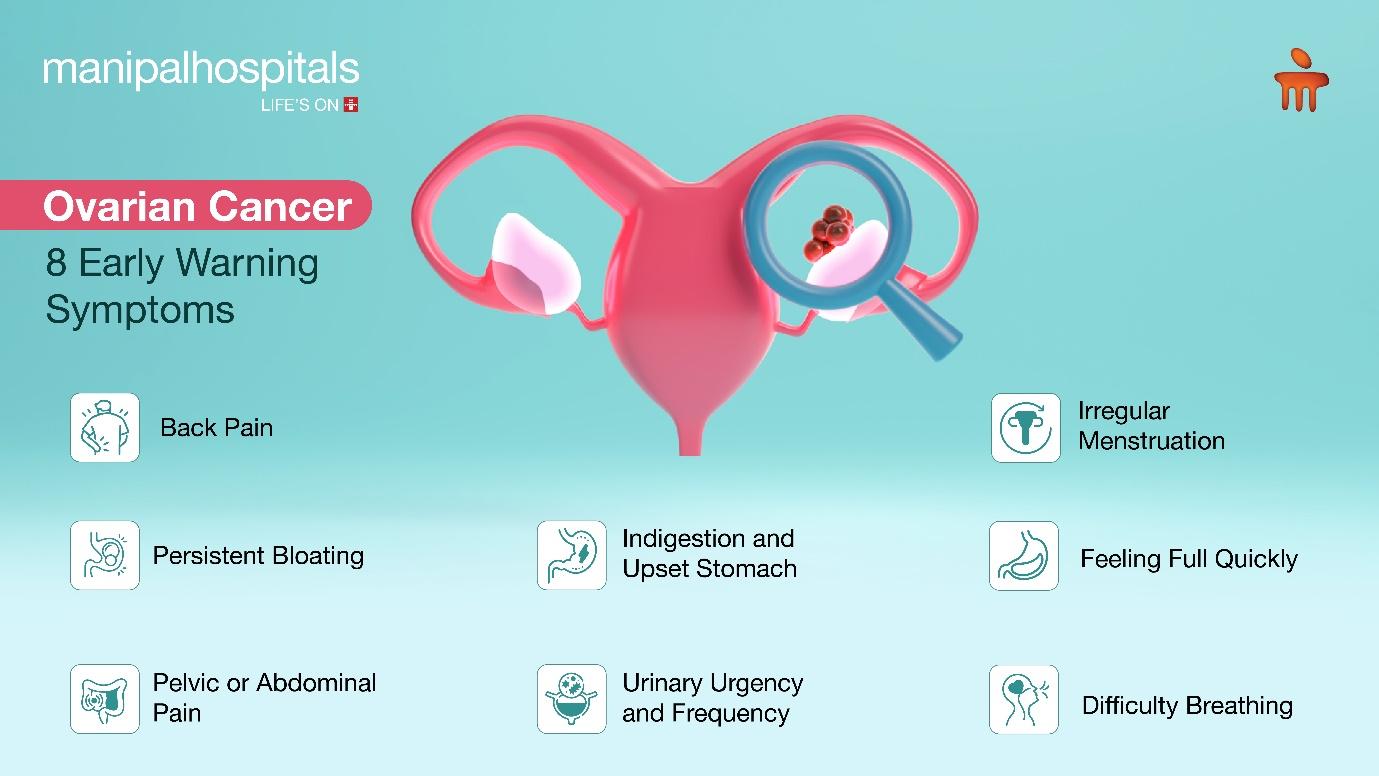
Listen to article
Loading audio...
Ovarian cancer is a serious condition that affects the female reproductive system. This disease is caused by abnormal cells multiplying uncontrollably in the ovaries and forming tumours. It often goes undetected until spreads within the pelvis and abdomen, making it more difficult to treat. Therefore, early detection is crucial for successful treatments and outcomes. Many women are unaware of the early symptoms as they can be vague and easily mistaken for other less serious conditions
Synopsis
Why is recognising the early signs of ovarian cancer is vital?
-
Improved Treatment Outcomes: Early diagnosis allows for more targeted and less invasive treatment options, significantly increasing the chances of a full recovery.
-
Preserve Quality of Life: Early intervention helps minimise the impact of the disease on a woman's overall well-being.
8 Early Warning Signs of Ovarian Cancer

1. Persistent Bloating
Persistent bloating is the most common early sign of the condition. Experiencing bloating that lasts for more than a few weeks and does not seem related to dietary habits, could be a warning sign. This type of bloating is often described as a feeling of fullness or swelling in the abdomen.
2. Indigestion and Upset Stomach
Indigestion or upset stomach, when it becomes a chronic issue, can be an early indicator of ovarian cancer. This symptom may be accompanied by frequent heartburn, nausea, or indigestion that lasts for weeks on end.
3. Feeling Full Quickly
Experiencing a sensation of fullness after eating very little can be a cause for concern, especially if it's a new development.
4. Pelvic or Abdominal Pain
Pelvic or abdominal cramps that are persistent and unexplained can be an early symptom of ovarian cancer. These cramps are often different from menstrual cramps and can occur at any time during the menstrual cycle. Continuous or severe cramping should not be ignored.
5. Urinary Urgency and Frequency
An increased urgency to urinate, even when the bladder is not full, can be a symptom of ovarian cancer. This urgency may be accompanied by an increase in the frequency of urination. If you notice these changes without any obvious cause, it is important to get checked.
6. Back Pain
Unexplained back pain, particularly in the lower back, can sometimes be a symptom of ovarian cancer, especially if it's persistent.
7. Irregular Menstruation
Significant changes in your menstrual cycle, such as heavier bleeding than usual, bleeding between periods, or irregular periods (polycystic ovarian syndrome) altogether, warrant a visit to your doctor.
8. Difficulty Breathing
Although less common, advanced ovarian cancer can sometimes cause fluid build-up in the abdomen, making it difficult to breathe.
Symptoms like these may also be caused by other conditions. However, if you experience any of these symptoms persistently (more than 12 times a month), it is crucial to consult a medical professional. You can also refer to our best gynaecologist in Goa for a proper diagnosis.
Risk Factors for Ovarian Cancer
-
Family History
-
Genetic Predisposition
-
Age
-
Menopause
-
Endometriosis
-
Hormone Replacement Therapy (HRT)
Treatment Options Vary Depending on the Stage
Treatments for ovarian cancer are also called ovarian cancer therapy and it depends on the stage of the disease. Stage 1 ovarian cancer symptoms, often silent, might be addressed with surgery alone. However, more advanced stages typically involve a combination of surgeries to remove the tumours and chemotherapy medications to target the remaining cancer cells.
Consult our gynaecology hospitals in Goa if you need treatment for ovarian cancer.
Conclusion
Recognising the early symptoms of ovarian cancer is crucial for timely diagnosis and effective treatment. Persistent bloating, indigestion, feeling full quickly, back pain, frequent urinary urgency, pelvic or abdominal pain, and irregular menstruation are key signs to watch for.
If you experience any of these symptoms, especially if they persist, consult a healthcare professional at Manipal Hospitals, Goa. Awareness and early detection are vital and they aid in improving the treatments of ovarian cancer therapy. Early intervention can make a significant difference in the fight against this silent yet aggressive disease.
FAQ's
While there's no single screening test for ovarian cancer, doctors might recommend a pelvic exam, blood tests, or imaging tests to evaluate the ovaries and surrounding areas.
While there's no guaranteed way to prevent ovarian cancer, certain lifestyle choices might help reduce your risk. These include maintaining a healthy weight, using hormonal birth control for extended periods, and considering discussing genetic testing if you have a strong family history.
Ovarian cancer treatments may have some side effects, such as fatigue, hair loss, nausea, nerve pain and so on. However, these are manageable with medication and supportive care
Ovarian cancer treatment, both surgery and chemotherapy can impact fertility. If you plan on having children, discuss fertility preservation options with your doctor before starting treatment.



















 5 Min Read
5 Min Read














